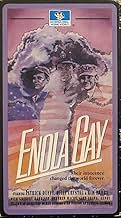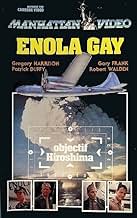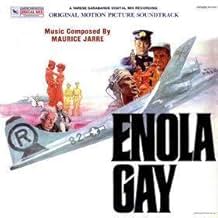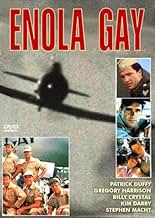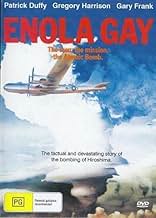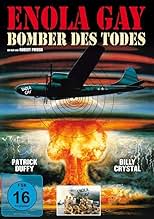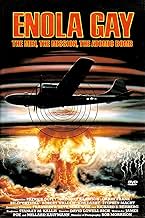Enola Gay: The Men, the Mission, the Atomic Bomb
- Filme para televisão
- 1980
- 2 h 36 min
Adicionar um enredo no seu idiomaThe decision to drop the atom bomb, the secrecy surrounding the mission, and the men who flew it.The decision to drop the atom bomb, the secrecy surrounding the mission, and the men who flew it.The decision to drop the atom bomb, the secrecy surrounding the mission, and the men who flew it.
- Direção
- Roteiristas
- Artistas
- General Groves
- (as Richard T. Herd)
Avaliações em destaque
What was the attitude of the flight crews who dropped the atomic bomb on Hiroshima and Nagasaki? Where does the name Enola Gay come from? Is it true that one of the crew spent years in an insane asylum after committing this unspeakable act? Was the action justified? The book this is based on answers many of these questions.
The Japanese were using back door channels to find a way of surrendering with honor, or at least to surrender and preserve their Emperor. American diplomats were un-aware of these attempts. Presidential advisers estimated the cost of invading the Japanese islands in human lives (American lives) would be in the hundreds of thousands. How the numbers were arrived at is anybody's guess.
One of the crew members had a depressive personality and suffered an un-related nervous breakdown later in life. It has become urban legend that he went insane because of remorse following Hiroshima.
Enola Gay was the name of Colonel Tibbets' mother. It was common practice for bomber crews in all the theaters of operation in World War II to name their aircraft after sweet hearts, wives or mothers.
The actors in this mini-series do a fine job in trying to express the attitudes of WWII flyers and ground crew. It is a fine adaptation of the book and the preparation of the mission and the top secret nature of the job given to those young men is an important story that sheds light on why the bomb was dropped on human beings.
I assumed that I'd seen an unrepresentative section so watched a repeat. In a knockabout comic scene in "the john" a security man disguised as a plumber has been caught by the aircrew listening in to their conversations. The scene exactly resembled that in those many many comic movies set the armed forces - from Operation Petticoat to Sargeant Bilko. How could such a huge, dramatic and sombre story receive such treatment? It was not simply incompetent but given the gravity of the subject matter, distasteful.
I contrasted it with the superb Emmy-awarded "Day One" with Brian Dennehy as General Groves, a military bulldozer whose responsibility it was to drive the immense project forward often in the face of the sophisticated scruples of the brilliant scientists he had no choice but to work with. Day One seemed to give absolute full and accurate measure to the characters and events - the first IMDb review on it is particularly worth reading. David Strathairn excellent as Oppenheimer. Even better was the 1980 mini series "Oppenheimer" with Sam Waterston in the title role.
Given these two superb renderings of the genuinely world shattering story I cannot imagine how "Enola Gay etc" came to be conceived let alone made. Rightly it received not a single award nomination.
I have read many books and have seen many films about the Manhattan Project and dropping the atomic bombs on Japan. This film gets the chronological timing wrong in several places and uses comic relief when none is required.
Bob Lewis is portrayed as an old buddy of Paul Tibbets, yet I do not recall ever reading or seeing any documentation that would support such a relationship. Tibbets was portrayed as saying he wanted to pick his own men rather than the ones selected by his superiors. In fact, Tibbets did indicate that he wanted to make personnel selections, but that was probably no more than thirty men he had commanded previously. A few of the men I remember he selected included his radio operator, bombardier, navigator, and two other enlisted men who actually flew with him on the mission.
The 509th Composite Group consisted of about two thousand men, so his personally choosing less than fifty of the two thousand was no big deal. It seemed the director, the writers, and the actors had little or no knowledge about the Manhattan Project and especially the 509th mission details. It seems a shame this film falls so short in these details.
Best wishes, Dave Wile
It was not until 1955 when Lewis, then an employee of a candy company, told a Japanese minister that he had written, "My God, what have we done?" in his journal. Lewis had only written "My God," but his attitude toward nuclear weapons had changed due to the daily fears of Americans during the Cold War that the Soviets were going to nuke a U.S. city. So he put an impromptu addendum on his written statement 10 years later.
Intercoms on a B-29 were used by pushing a button to talk and releasing it to listen. There was no recording of the crew's comments, and Lewis's "My God" was conveyed in written form only.
The movie was very interesting, although Lewis's asking "What is that funny name (Enola Gay) doing on my plane?" is shown in a more pleasant light than the actual incident, in which Lewis was very angry at Tibbets being named to take over the Hiroshima mission. Lewis had flown the first six missions of the previously unnamed B-29, but only Tibbets, the two flight weaponeers, radar countermeasure expert Jacob Beser and perhaps bombardier Thomas Ferebee knew what the bomb the Enola Gay was carrying was capable of. Lewis knew that the plane was carrying a powerful bomb but had no idea of the actual power that "Little Boy" had. No other regular crew member of the Enola Gay did either on that particular morning in August 1945.
Você sabia?
- CuriosidadesPaul Tibbets confessed that he had never any problems to sleep after dropping the bomb over Hiroshima. The Hiroshima bombardment killed less people than the raids over Tokyo pulled in 1945 and which caused the death of more than one hundred thousands of people.
- Erros de gravaçãoMajor Tom Ferebee has to unroll his autographed "Short Shot" money roll to help Colonel Paul Tibbets and himself remember the last name of Theodore "Dutch" van Kirk. In actuality the three men had flown over 40 combat missions together on the same crew in Europe, and it is highly improbable that either Tibbets or Ferebee, let alone both of them, would have forgotten van Kirk's name.
- Citações
Colonel Paul Tibbets: Improperly commandeered an airplane...
Captain Bob Lewis: I was on official business.
Colonel Paul Tibbets: Lost in the middle of a snowstorm...
Captain Bob Lewis: Do you expect me to control the weather?
Colonel Paul Tibbets: Didn't occur to you to use instruments...
Captain Bob Lewis: My compass was out, SIR.
Colonel Paul Tibbets: Set down in the middle of a corn field...
Captain Bob Lewis: It was on the approach to the airport.
Colonel Paul Tibbets: So why didn't you use the airport?
Captain Bob Lewis: Because I was out of gas! It was one gorgeous piece of flying.
Colonel Paul Tibbets: People are going to say that I was lenient on you because of our friendship. Don't even start to believe it.
Captain Bob Lewis: Oh, c'mon, Paul...
Colonel Paul Tibbets: You're dismissed.
- ConexõesEdited into Missão Tubarão: A Saga do Navio Indianápolis (1991)
Principais escolhas
Detalhes
- Data de lançamento
- País de origem
- Idioma
- Também conhecido como
- Enola Gay - Bomber des Todes
- Locações de filme
- Acton, Califórnia, EUA(Arizona scenes)
- Empresa de produção
- Consulte mais créditos da empresa na IMDbPro
- Tempo de duração2 horas 36 minutos
- Cor
- Mixagem de som
- Proporção
- 1.33 : 1
Contribua para esta página


